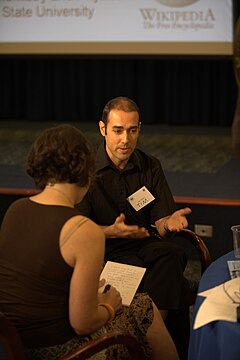Don’t call yourself a perfectionist, for one thing.
 As the academic year begins, we also rapidly approach the time of year for admissions interviews, those high-pressure days when prospective MFT graduate students have anywhere from just a few minutes to a full day to impress their chosen programs. I have been doing admissions interviews for six years now. Along the way, I have seen marginal students get into their desired program on the strength of a good interview — and I have seen academically strong students whose poor interviewing ultimately kept them out of the programs they sought.
As the academic year begins, we also rapidly approach the time of year for admissions interviews, those high-pressure days when prospective MFT graduate students have anywhere from just a few minutes to a full day to impress their chosen programs. I have been doing admissions interviews for six years now. Along the way, I have seen marginal students get into their desired program on the strength of a good interview — and I have seen academically strong students whose poor interviewing ultimately kept them out of the programs they sought.
There are a number of good guides out there that can help with general interviewing skills. This post is intended to highlight those behaviors that, in my opinion, can have particular (and sometimes unexpected) weight in interviews specifically for family therapy graduate programs.
Please bear in mind that all of this is simply my own opinion and experience. Every interviewer and every program is different. Still, I hope these help in your preparation. They are in no particular order. If you are interviewing soon, good luck!!
Assume that the whole time you are on campus is your interview. In other words, remain your charming, professional self even in times that seem more informal, such as meal breaks or meetings with current students. Many programs use these opportunities to gain a more complete impression of applicants, and do consider feedback from everyone who has met you in the admissions process when making their decisions.
Be specific. Sometimes, interviewees keep their answers short and simple to avoid saying anything the interviewers may find off-putting. This strikes me as unwise. The interview is the chance for the program to get to know you; take it! If you’re still a mystery after the interview, they might rightly wonder how successful you would be at building relationships with other new people (namely, clients). Talk in specific terms about your skills, your goals, and your experience. If your answers lead the program to turn you down, then you weren’t a good fit in that program anyway — and better to know in advance.
Set yourself apart. A lot of candidates spend time highlighting traits that are generally positive, but common in the pool of applicants you’re competing with. Talking up common strengths (like organization, multitasking, working well with others, and having a passion for the field) is unlikely to hurt you, but does little to help. Be prepared with specific examples of you demonstrating those strengths, and spend a majority of your time talking about pieces that make you unique. These might include specific work, research, or volunteer experiences relevant to the field; international or multicultural experiences that led you to develop specific skills (if you are multilingual, particularly highlight that); or other skills or experiences you have that others in the applicant pool probably don’t have. The more of these kinds of traits you can highlight, the more the program may see you as a uniquely qualified candidate instead of just one among many.
If your interviewer asks what your flaws or struggles are, do not say you are a “perfectionist.” It sounds at first like a good answer — after all, it means you are driven to succeed, right? In fact, interviewers may see it as a red flag. It looks like you could be trying to dodge the question with salesmanship instead of just answering it, like the interviewee for a corporate job who says his biggest problem is that he just. cares. too. much. about the company. If you do label yourself a perfectionist in an interview, hope that the interviewers see it as a dodge; that is actually the friendlier interpretation. Because if you are telling the truth about being a perfectionist, you are admitting that you are the kind of student who suffers paralyzing anxiety at the thought of screwing up anything, large or small. That does not leave a good impression among those who would be trying to teach you. Ideally, therapists (and students) want to do well, but also allow themselves the freedom to learn from their mistakes without doing what true perfectionists do: getting defensive or down on themselves in the face of even mild criticism or failure. Simply put, wanting to do well is a desirable personality trait in an applicant. Desperately needing to be perfect is not.
Avoid platitudes. Presumably you would not be applying to an MFT program if you did not want to “help people.” If you want to show your kind and generous spirit, be specific: Who in particular do you want to help, and why them? Similarly, it is safe to assume that all the applicants with whom you are competing would like to “make a difference.” Using phrases like these on their own is just wasting words; they do nothing to set you apart, and if anything, they can arouse skepticism on the part of your interviewers. Be prepared to explain such statements in greater depth. Better yet, avoid the platitudes entirely and cut to the chase.
Know your interviewers. If you know in advance who will be interviewing you, look online to see what you can learn about their research interests, the classes they teach, and their recent presentations or publications. (In smaller programs, learn what you can about *all* the faculty; that way you can talk intelligently about whose interests most closely align with yours.)
Be direct and brief with any negative discussion. Interviewers may ask about prior struggles you have had, especially if they see a low GPA on your transcript or see that you left prior work positions abruptly. Family therapy faculty are going to be particularly interested in how you handled such difficult personal interactions, knowing that managing conflict professionally and respectfully is a major part of what you will be expected to do as a student and as a therapist. When discussing other people or institutions with which you have had conflict, keep your discussion of others’ actions short, factual, and fair. Take responsibility for your part in the problem. And talk in specific terms about what you learned from it, and how you have put those lessons into action.
Ask questions. The admissions interview is a two-way street. A program that accepts you only benefits if you actually enroll in classes. Come to your interview prepared with at least 2-3 questions about the program (here are a few things worth asking an MFT program about), the faculty, or other students. Of course, keep time constraints in mind when determining just how much to ask about during the interview process. Understand if your interviewers can’t answer all of your questions right away, or if they deflect some questions to program staff; they are under a time schedule, and no one person is likely to know every detail of program information. If they offer the opportunity to follow up via phone or email to get those questions answered, take them up on it.
As I mentioned at the beginning of this post, every program and every interviewer is different. If you have other tips you can share with future interviewees, including tips on interviewing at specific programs, please feel free to share them in the comments.
 It’s a happy new year indeed! Good news abounds for those looking for academic positions in marriage and family therapy; there have been a LOT available this cycle. And even now, many are still accepting applications. Here are a number of universities still looking (as of January 19, 2012) to fill faculty positions. In most cases, the positions would start in Fall of 2012.
It’s a happy new year indeed! Good news abounds for those looking for academic positions in marriage and family therapy; there have been a LOT available this cycle. And even now, many are still accepting applications. Here are a number of universities still looking (as of January 19, 2012) to fill faculty positions. In most cases, the positions would start in Fall of 2012. 

